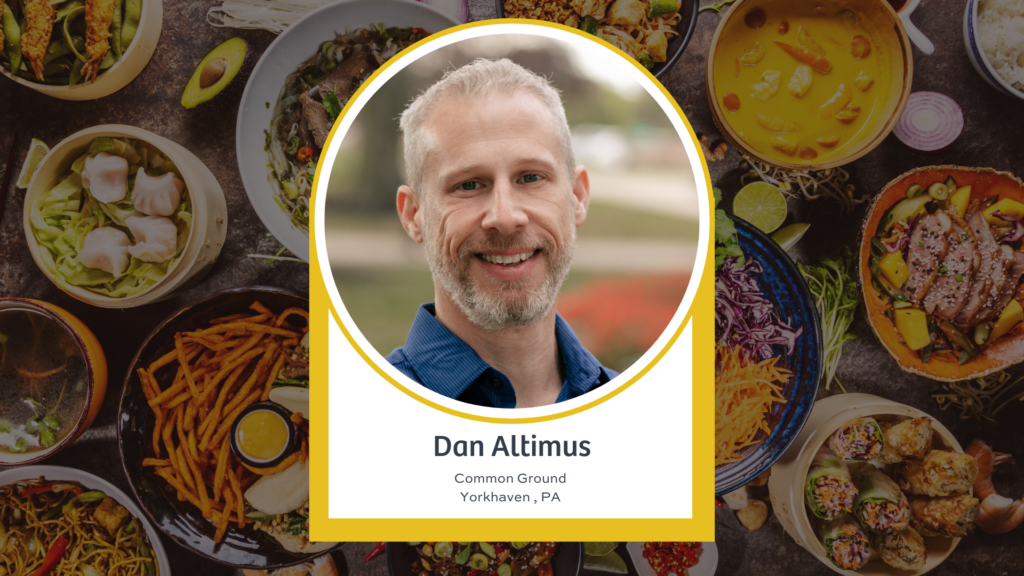Three Ways to Learn
Listen
Watch
Show Notes
Dan had a plan for planting in an exciting city, but through a series of nudges, they ended up in a small town with a significant drug problem. In this fascinating interview, you’ll hear how they attracted one-sixth of their town to their Dinner Church. You’ll also hear about why they stayed after the COVID pandemic shut down their congregation, and what their ministry looks like today.
Daniel Altimus is the pastor of Common Ground Church in York Haven, Pennsylvania. Never imagining himself as a church planter, God connected Daniel to two other men with a love for the gospel and a heart to see people discipled. After a period of sowing the gospel for three years in York Haven, they planted Common Ground Dinner Church in September of 2017. Daniel lives in York Haven with his wife Angie. They have two adult sons, Luke and Shane.
Help us spread the word about the Dinner Church podcast by subscribing and leaving us reviews on Apple Podcasts, Spotify, YouTube or wherever you enjoy your podcasts.

Related Resources:
Email us: podcasts@freshexpressions.com
Interview Summary
“Let’s just say it took us out of our comfort zones in a different way…” – Dan Altimus
This poignant reflection by Dan Altimus, a key figure in the Dinner Church movement in Yorkhaven, Pennsylvania, captures the transformative journey many have experienced. In this detailed exploration of this Dinner Church podcast episode with Dan Altimus, we delve into the innovative model of Dinner Church—a place where food, faith, and community intertwine to rejuvenate not only individual lives but entire communities.
Dan Altimus, alongside his wife Angela, leads a significant community effort in New York Haven through the Dinner Church Collective. With roots deeply embedded in the community, Dan’s ministry focuses on revitalizing the local area through the ancient practice of gathering around the dinner table—turning a simple meal into a profound communal experience.
The Essence of Dinner Church: More Than Just a Meal
A Rebirth from Decline
The Dinner Church model was born out of a response to a period of unexplained decline within Dan Altimus’s community. This decline prompted the community leaders to seek new, impactful ways to engage and uplift their surroundings. The transition to a Dinner Church wasn’t merely about changing the mode of worship or community gathering; it was about responding to a deep, communal need for connection and revitalization. By embedding the church within the routine act of sharing meals, they tapped into a longstanding tradition that promotes fellowship and unity, thus revitalizing the community’s spirit and engagement.
“And 20 years ago, our church went into an unexplainable decline. much frustration that soon led to much prayer. and we really felt the Lord direct us to begin to experiment with this ancient form of church, the table church, if you will.” – Dan Altimus
Core Principles of Engagement
Dinner Church is built on principles that emphasize simplicity, affordability, and evangelistic effectiveness, making it a potent tool for community outreach across various demographics and locations. This model strips back the often complex and resource-heavy structures of traditional churches, opting instead for a more accessible and relatable format. Meals serve as a universal invitation into community life, breaking down barriers and fostering an environment where people can engage in spiritual discussions in a relaxed and welcoming setting. These principles ensure that Dinner Churches can be easily replicated and adapted across different contexts, making them versatile and inclusive.
“Dinner churches are affordable. They are simple. They are very effective at evangelism. And they are rapidly increasing across the country and across all denominational lines and across all social locations.” – Verlon Fosner
Impactful Outreach
The transformative impact of Dinner Church is vividly seen in the personal stories of community members who find not just physical nourishment but also emotional and spiritual support. The inclusive setting allows people who might not typically step into a traditional church setting to feel welcomed. This approach significantly shifts how outreach is conducted, focusing on serving and building the community from within rather than merely preaching to them. It’s about active engagement—meeting people where they are, addressing real needs, and providing a platform for genuine transformation and connection.
“And one of the gentlemen there that was leading that conference, he handed me a book called welcome to Dinner Church … I read probably a chapter of that book, and it was like, instantly I knew this is this was the answer… They read just a little bit and they were like, yes, this is this is where God wants us to go.” – Dan Altimus
As we reflect on the conversation with Dan, it becomes evident that Dinner Church is more than a feeding program; it’s a catalyst for community transformation. By fostering an environment of acceptance and support, Dinner Church empowers individuals to partake in a shared vision of growth and development.
Reflection Questions
- What makes the concept of Dinner Church appealing to communities facing social challenges?
- How does sharing a meal facilitate deeper connections among community members?
- How can individuals contribute to the sustainability of such community initiatives?
- What are the long-term impacts of such a community-focused approach on local development?
- How does the concept of Dinner Church challenge traditional perceptions of church and community service?

